Matthew Rankin’s Universal Language (2024)
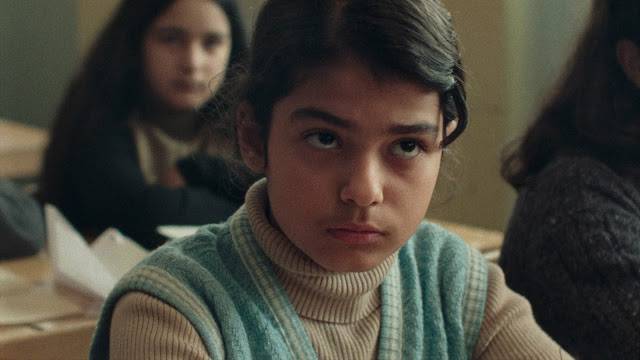
I should say up front that it would be impossible for me to write an “objective review” of Matthew Rankin’s Universal Language (2024). This is partly because it’s always so difficult to write about the work of someone you know personally – how can you disentangle the work from the person you know? – but it’s also because of the singularly idiosyncratic nature of the film itself. While I enjoyed it more than any other film I’ve seen in a theatre in a long time, I’m at a loss how to interpret just how it works to produce the enormous pleasure it gives.
I’ve known Matthew for more than thirty years, since he arrived in the office of the Winnipeg Film Group as a precocious fourteen-year-old wanting to sign up for the basic filmmaking workshop. He was an odd kid, very serious, but in time he revealed a very individual, dry sense of humour. The combination of intelligence and that humour has run through the work he has done since those first awkward steps at the WFG. His first short film, Daft, was an overt attempt to emulate Mr. Bean, but far more promising (and indicative of future interests) was the work he did with Walter Forsberg, with whom he co-founded L’atelier national du Manitoba; together they sifted through mountains of media trash from Winnipeg television stations and cable access shows to shine a light on strange cultural phenomena which provided elements of the city’s unconscious memory and sense of identity.
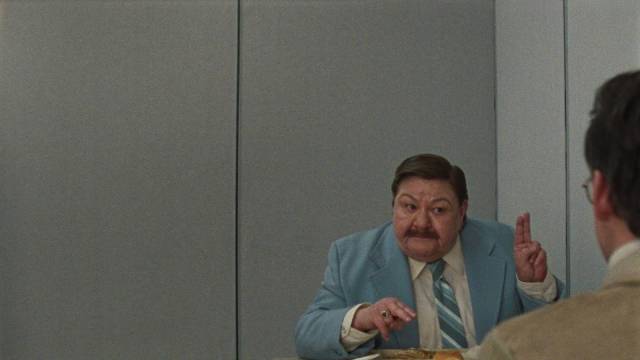
Eventually, Matthew moved away to pursue an education in Montreal, where he settled into a bilingual, bicultural life which could be seen as the very definition of a fractured Canadian identity. Maintaining connections with Winnipeg, Matthew made a number of experimental short films here and in Quebec, switching effortlessly between English and French, eventually culminating in his first feature, The Twentieth Century (2019). Seemingly rooted in the now familiar Prairie Expressionism first made popular in the 1980s by John Paizs and Guy Maddin, it combined its stylistic play with Matthew’s interest in the absurdities of Canadian history, culture and politics.
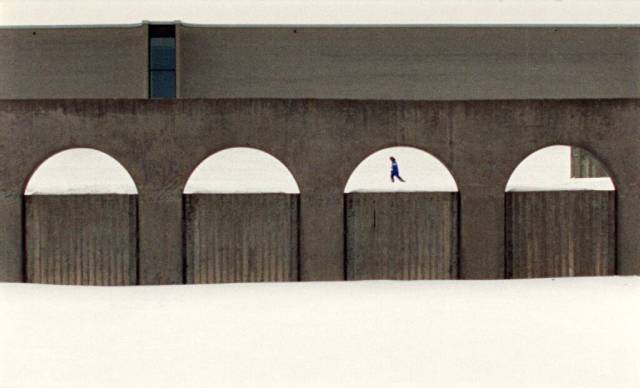
Those interests also run through Universal Language, though here they expand to embrace a view of a transnational world in which people from multiple cultures share a common human identity despite their individual differences. Matthew has long had a sense of connection with Iran and, more specifically, the cinema of Abbas Kiarostami and the Institute for Intellectual Development of Children and Young Adults – this first appeared in a brilliant three-minute short he made in 2008; shot on a cell-phone as part of a workshop, Self-Portrait: M. Rankin is a very funny homage to Kiarostami’s Close-Up (1990), shot in Farsi. In some ways, this contains the seed of his new feature, in its overt references to Kiarostami’s work, culminating in the theme of identities merging into one another and illuminating connections within and across cultures.
But if that sounds heavy and didactic, Universal Language is anything but. The lightness of touch and formal precision of the film produces the fullest expression yet of Matthew’s wry wit and deep empathy. There are numerous laugh-out-loud moments, but as the multi-stream narrative unfolds it accumulates a deep emotional resonance rooted in Matthew’s personal experience, with specific individual details triggering currents of recognition which confirm the implications of the title – that we all share a universal emotional language which erases and renders irrelevant all the cultural differences we allow to separate us.
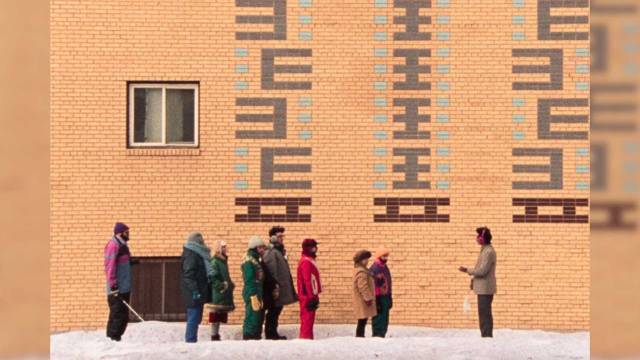
The primary device Matthew uses is a visual conflation of Winnipeg with Tehran; I’ve never seen Winnipeg conveyed quite like this on film, a bleak urban landscape which emphasizes the architectural geometry of brutalist buildings and roadways, with familiar structures denaturalized by replacing all signage with Farsi, translated in subtitles. The population is largely comprised of Iranian immigrants, with an admixture of European, Asian, First Nations and French-Canadian, the dialogue switching back and forth between Farsi and French. Isabelle Stachtchenko’s camera creates an almost abstract field which produces a tension between the contingent activity of the characters and the almost implacably inhuman landscape they inhabit.
These characters frequently evoke the work of Kiarostami, with the initial scenes in a school classroom dominated by an angry, abusive teacher echoing the documentary Homework (1989), while the subsequent attempts of two children to help their friend who has lost his glasses calling to mind the children’s epic adventure of Where Is the Friend’s House? (1987). Matthew’s sensitivity and empathy towards these children is one of the foundations of the film’s deeply felt humanism as they encounter a series of adults who range from distracted, to suspicious, to helpful, although ultimately the children have to be self-reliant.
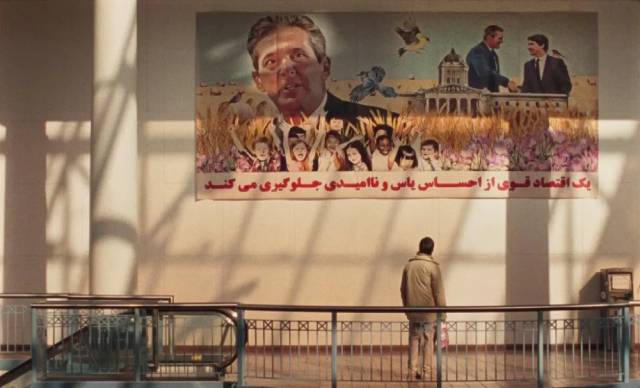
Within and around this central narrative, Matthew weaves two other threads. In one, a passionate tour guide takes an increasingly irritated group to various sites which are telling in their ordinariness; an apartment building with a decorative wall where nobody of any importance has ever lived; a small monument to Louis Riel beside a busy road, where he explains that Riel was condemned and hanged as a traitor in the 19th Century, though he’s now viewed as a heroic figure, though the site of this monument suggests he still doesn’t get much respect; a bench at a bus stop where decades ago someone left a briefcase, which has rested there ever since in case its owner ever returns to claim it; and finally the Portage Place Mall, built in 1987 when it initiated the slow death of the vibrant city centre and now stands virtually derelict – the group are forced to move on by a security guard whose task is to prevent loitering.
The third strand deals with a melancholy character named Matthew Rankin, played by Matthew. A former Winnipegger, we first see him resigning from a civil service job in Montreal; his boss admonishes him not to say anything negative about Quebec when he returns to Winnipeg – the boss, having only the vaguest idea of Western Canada, insists that he must be going to Alberta because it’s the only place he’s aware of out West. Arriving back in Winnipeg, Matthew calls his mother’s number and is confused when an unknown man answers and arranges to meet him that evening. He visits his old family home and discovers another family living there, welcoming him in and offering him tea.
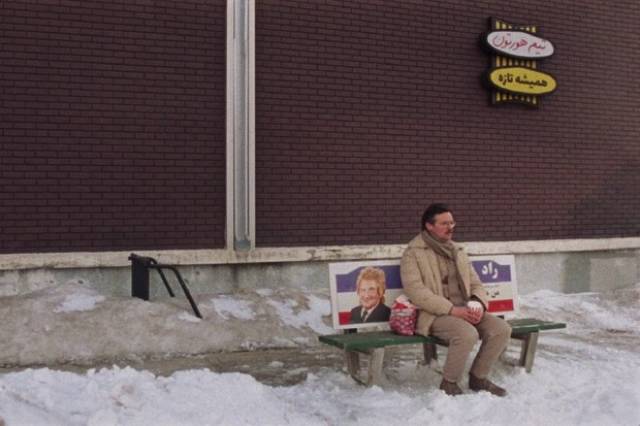
With hours to kill before his meeting, he wanders around the bitter, wintry streets, encountering the children on their quest, and visiting the “Brookside Cemetery”, a bleak collection of graves beneath a busy overpass. Here, the film enters a more personal register as he stops to place a flower on his father’s grave – the headstone includes a photo of Laird Rankin, whom I had met a number of times, a charming, witty man who was a familiar figure in Winnipeg’s publishing community. Although the character of Matthew Rankin had already raised the idea that the film has an autobiographical element, here it suddenly deepens with a sense of personal loss which increases as it enters the final act in which Matthew meets Massoud, the man who had answered his mother’s phone.
Massoud, the tour guide, tells Matthew that he had met his mother when doing small chores for her and that as she gradually slipped into dementia she began to believe that Massoud was actually Matthew. When she lost her home, Massoud and his family took her in and have been looking after her ever since. The kindness and generosity of this family highlight Matthew’s sense of loss and guilt, while reinforcing the larger theme of shared connections which render apparent differences irrelevant.
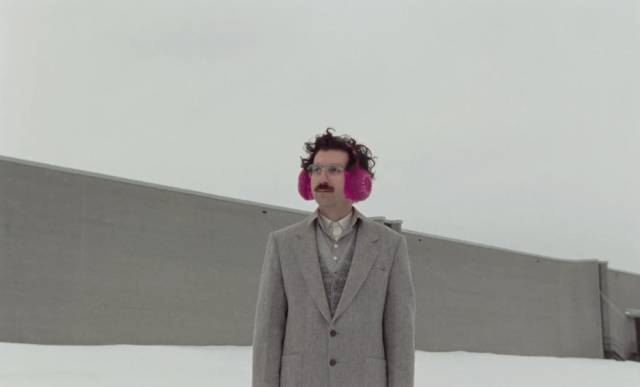
The non-linear structure of the intertwined narratives is eventually left open-ended, implying that existence is cyclical, a pattern of encounters which produce subtle changes in individuals whose shared experiences serve to bring them together in denial of the illusion of difference. And this is conveyed on a formal level which is delightfully witty both visually and verbally. Every frame and setting contains comic details which spark moments of recognition. The othering of Winnipeg with an overlay of Iranian language and culture paradoxically throws the actual city into sharp relief, making visible what has become largely unseen through familiarity and habit – by implication showing how immigration and the multi-cultural social matrix renews and revitalizes the city.
Universal Language – written by Matthew with Ila Firouzabadi and Pirouz Nemati (who plays Massoud) and performed by a cast which includes a lot of first-timers as well as some experienced actors – is a marvellous achievement, what it has to say resonating far from Winnipeg as it has won and been nominated for numerous awards at festivals around the world. It’s heartening to know that people are responding so positively to its refutation of the xenophobia which seems to be spreading so rapidly through the West.
Comments
I definitely need to see this movie! Thanks for the great review. I’ve often wanted to travel to Winnipeg. My cousin, Dale, played hockey there back in the 1980’s and a statue of him was placed somewhere in the downtown area, after he passed away several years ago. I’ve often wanted to see this statue up close.
I’d suggest waiting until summer unless you want to get the full Universal Language experience! It’s pretty cold right now!